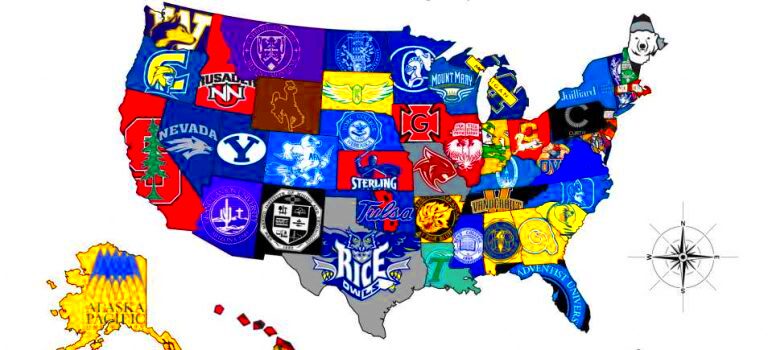When considering your education,
technology colleges in the USA stand out for their focus on practical skills and innovation. These institutions provide students with the tools they need to succeed in a fast-paced, ever-evolving job market. From computer science to engineering, these colleges offer programs that blend theoretical knowledge with hands-on experience.Whether you dream of designing the next big app or developing cutting-edge
technology, you’ll find a supportive environment that fosters growth and creativity.
Reasons to Choose a Technology College for Your Education

Choosing a
technology college can be a life-changing decision for many students. Here are some reasons why you might consider this path:
- Focused Curriculum: Programs are tailored to meet industry needs, ensuring that you learn relevant skills.
- Hands-On Experience: Many colleges offer labs, workshops, and projects that give you practical experience.
- Networking Opportunities: You’ll connect with industry professionals through internships and events, which can lead to job offers.
- Career-Oriented Education: Colleges often partner with companies to help students find jobs after graduation.
- Innovative Environment: Exposure to the latest technologies and research keeps you ahead in your field.
Overall,
technology colleges provide an education that prepares you for the challenges of the future.
Top Technology Colleges in the USA

Here’s a list of some of the top
technology colleges in the USA, known for their excellent programs and strong industry connections:
| College Name | Location | Notable Programs |
|---|
| Massachusetts Institute of Technology (MIT) | Cambridge, MA | Engineering, Computer Science, Artificial Intelligence |
| Stanford University | Stanford, CA | Computer Science, Bioengineering, Robotics |
| California Institute of Technology (Caltech) | Pasadena, CA | Physics, Computer Science, Electrical Engineering |
| Carnegie Mellon University | Pittsburgh, PA | Software Engineering, Cyber-Physical Systems, Robotics |
| University of California, Berkeley | Berkeley, CA | Computer Science, Electrical Engineering, Data Science |
These institutions are renowned for their commitment to technological advancement and their role in shaping the future. If you’re considering a career in
technology, these colleges are worth exploring.
Key Programs and Courses Offered
Technology colleges in the USA provide a diverse range of programs designed to equip students with the skills they need in various tech fields. These programs focus not just on theoretical knowledge but also on practical applications that mirror real-world challenges.Here are some key programs you might find:
- Computer Science: This program covers programming languages, algorithms, data structures, and software development.
- Information Technology: Students learn about network administration, cybersecurity, and system analysis.
- Engineering: Various branches, including electrical, mechanical, and civil engineering, focus on design, analysis, and innovation.
- Data Science: This emerging field combines statistics, machine learning, and data analysis to interpret complex data sets.
- Web Development: Courses in this program teach how to build and maintain websites, focusing on both front-end and back-end technologies.
Each program usually offers core courses along with electives, allowing students to tailor their education to fit their career goals. Practical labs, projects, and internships often supplement classroom learning, ensuring that graduates are well-prepared for the job market.
Campus Life and Student Support Services
Campus life at technology colleges is vibrant and engaging. Students often find themselves surrounded by like-minded peers who share a passion for technology and innovation. Beyond academics, there are plenty of opportunities to get involved and make lasting connections.Here's a glimpse of what campus life looks like:
- Clubs and Organizations: Many colleges have tech clubs, coding competitions, and hackathons that allow students to collaborate on projects and network.
- Events and Workshops: Regular workshops and guest lectures from industry leaders keep students updated on the latest trends and technologies.
- Student Support Services: Colleges typically offer academic advising, career counseling, and mental health services to help students thrive.
- Housing and Dining: Most campuses provide comfortable housing options and diverse dining facilities catering to different dietary needs.
These aspects of campus life contribute significantly to a well-rounded educational experience, helping students grow both personally and professionally.
Admission Process and Requirements
Getting into a technology college can seem daunting, but understanding the admission process can make it much easier. Each institution may have specific requirements, but there are common steps you can expect to follow.Here’s a typical admission process:
- Research: Start by researching colleges and their programs to find the best fit for your goals.
- Prepare Your Application: Gather necessary documents such as transcripts, letters of recommendation, and a personal statement.
- Standardized Tests: Some colleges may require SAT or ACT scores, while others may be test-optional.
- Submit Your Application: Complete the application forms and submit them before the deadline. Pay attention to application fees.
- Interviews: Some colleges may require an interview, either in-person or online, to assess your fit for their programs.
Additionally, financial aid applications, such as the FAFSA, are crucial for students seeking scholarships or loans. Being organized and proactive can help you navigate this process smoothly, paving the way for your future in technology.
Scholarship and Financial Aid Opportunities
Financing your education at a technology college can be a significant concern, but the good news is that many scholarship and financial aid opportunities are available. These resources can help ease the financial burden and make your educational dreams more accessible.Here are some options to consider:
- Merit-Based Scholarships: Many colleges offer scholarships based on academic achievement, talent, or leadership skills. These can significantly reduce tuition costs.
- Need-Based Financial Aid: Programs like the FAFSA can help determine your eligibility for federal grants, loans, and work-study opportunities based on your financial situation.
- Industry-Specific Scholarships: Some organizations and companies offer scholarships specifically for students pursuing careers in technology. Research to find those that align with your field of interest.
- State and Local Scholarships: Many states and local governments have scholarship programs that support students attending colleges in their region.
- Private and Non-Profit Organizations: Various organizations provide scholarships for underrepresented groups in technology, such as women and minorities. Look into these options as they may have fewer applicants.
Applying for scholarships often involves submitting an application, essays, and recommendations, so it's essential to stay organized and apply early. Remember, every bit of financial aid can help you focus more on your studies and less on finances.
FAQ about Technology Colleges in the USA
When considering technology colleges in the USA, you might have several questions. Here are some frequently asked questions that can help clarify common concerns:
| Question | Answer |
|---|
| What degrees can I earn at a technology college? | You can earn associate, bachelor's, and even master's degrees in various fields such as computer science, engineering, and information technology. |
| Do technology colleges offer online programs? | Yes, many technology colleges offer online courses and degree programs, providing flexibility for students who need to balance work and studies. |
| What is the average tuition cost? | Tuition varies widely, but on average, public technology colleges cost around $10,000 per year, while private colleges may charge significantly more. |
| Are internships required? | While not always mandatory, many programs encourage or require internships to give students real-world experience. |
| How can I improve my chances of getting admitted? | Maintain a strong GPA, participate in relevant extracurricular activities, and prepare for any required standardized tests. |
These FAQs can help guide your decision-making process and prepare you for your journey into technology education.
Conclusion on Pursuing Education in Technology Colleges
Choosing to pursue an education at a technology college can be one of the most rewarding decisions you make. With a focus on practical skills, innovative teaching methods, and strong industry connections, these colleges prepare students for successful careers in the ever-evolving tech landscape.As you explore your options, consider what programs align with your interests and career goals. Take advantage of scholarships and financial aid opportunities to lessen the financial burden, and don’t hesitate to ask questions about the admission process. Remember, your education is an investment in your future.With the right preparation and mindset, you can embark on a fulfilling journey that not only enhances your knowledge but also opens doors to exciting job prospects in technology. So, take the leap and start exploring the possibilities that await you in the world of technology education!
 Choosing a technology college can be a life-changing decision for many students. Here are some reasons why you might consider this path:
Choosing a technology college can be a life-changing decision for many students. Here are some reasons why you might consider this path: Here’s a list of some of the top technology colleges in the USA, known for their excellent programs and strong industry connections:
Here’s a list of some of the top technology colleges in the USA, known for their excellent programs and strong industry connections:
 admin
admin








